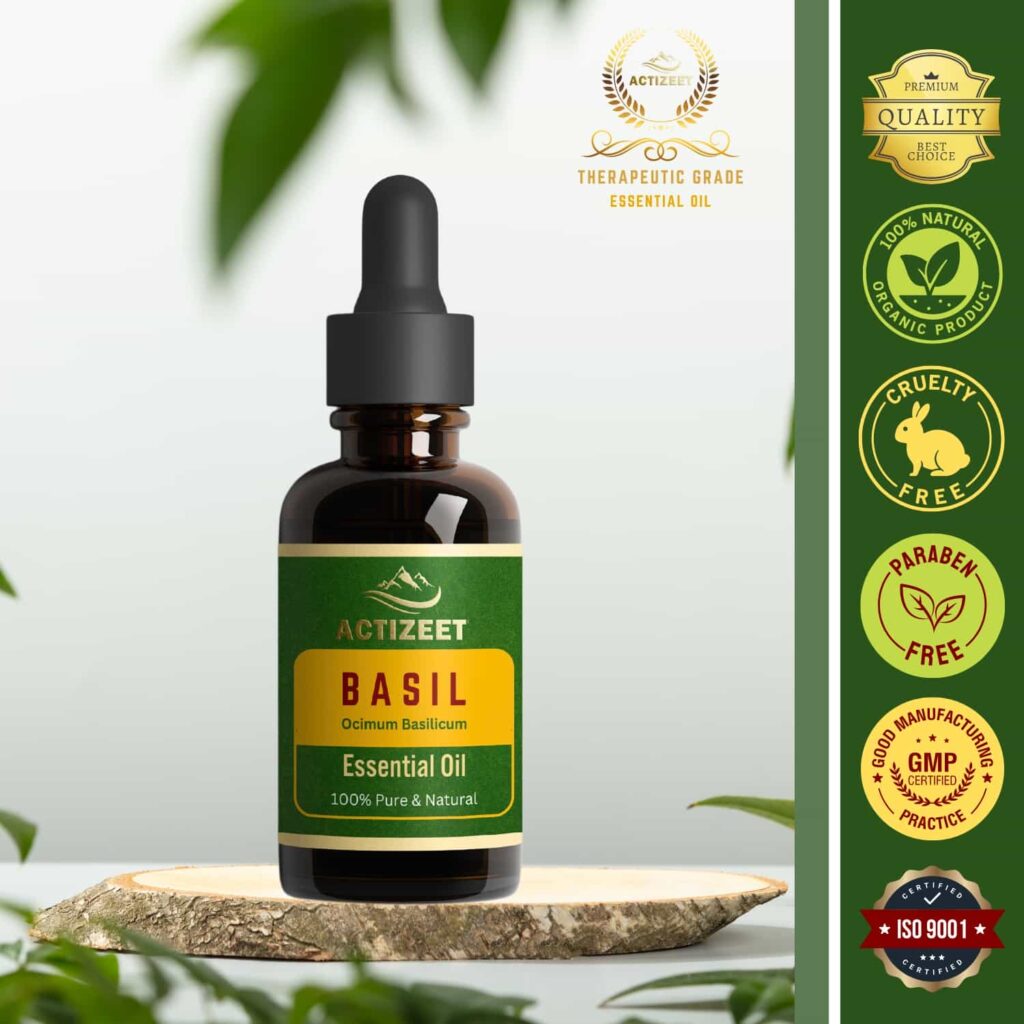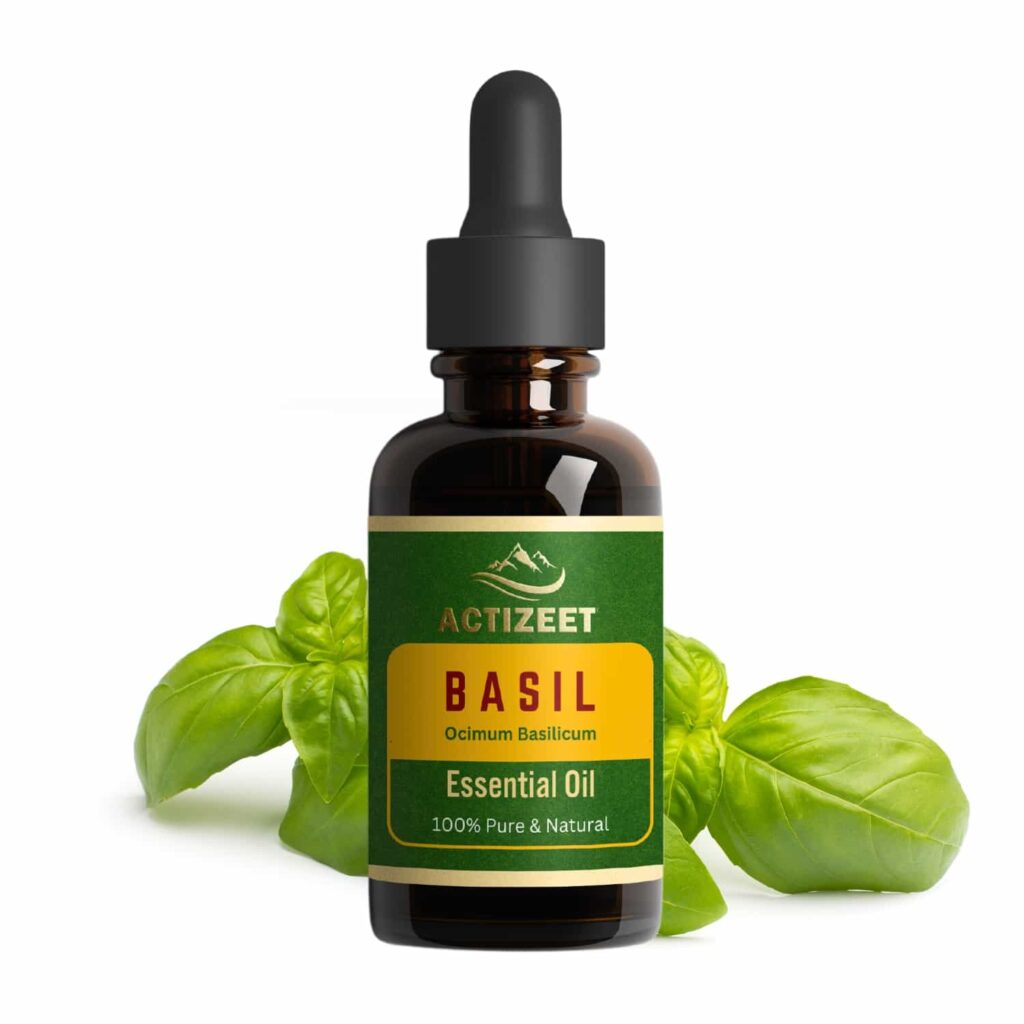Essential oils have become indispensable for aromatherapy, skincare, and natural remedies. Two popular choices—basil oil and eucalyptus oil—offer a range of therapeutic benefits, but they serve distinct purposes. Whether you’re looking to alleviate stress, repel insects, or clear respiratory congestion, choosing the right oil is essential.
In this blog, we’ll compare basil oil and eucalyptus oil across various factors, including their properties, benefits, and ideal uses, to help you decide: Basil oil vs eucalyptus oil: which is better for your needs?
An Overview of Basil Oil and Eucalyptus Oil
Understanding the origins and characteristics of basil oil and eucalyptus oil sets the stage for an informed comparison.
Basil Oil
Basil oil is extracted from the leaves of the Ocimum basilicum plant through steam distillation. Known for its sweet, herbal aroma, it has been used in traditional medicine for centuries to boost mental clarity, alleviate pain, and enhance digestion.
Eucalyptus Oil
Eucalyptus oil, derived from the leaves of the Eucalyptus globulus tree, is renowned for its cooling, camphorous scent. This oil is widely used to clear respiratory congestion, reduce inflammation, and repel insects.
Key Components and Properties
Both oils derive their therapeutic effects from unique compounds found in their plant sources.
Basil Oil’s Key Compounds:
- Linalool: Offers anti-inflammatory and calming properties.
- Eugenol: Known for its analgesic and antimicrobial effects.
- Citronellol: Acts as a natural insect repellent.
Eucalyptus Oil’s Key Compounds:
- Eucalyptol (1,8-Cineole): A powerful decongestant and anti-inflammatory agent.
- Alpha-Pinene: Supports respiratory health and offers antimicrobial benefits.
- Limonene: Acts as a natural antioxidant.
While both oils boast antimicrobial and anti-inflammatory properties, basil oil excels in relaxation and focus, whereas eucalyptus oil is unmatched for respiratory health and cooling relief.
Comparing Benefits: Basil Oil vs Eucalyptus Oil
The benefits of basil oil and eucalyptus oil overlap in some areas but differ significantly in others.
Stress Relief and Mental Clarity
- Basil Oil: Its sweet, herbal aroma promotes relaxation, reduces stress, and enhances mental focus. It’s an excellent choice for combating fatigue and uplifting mood.
- Eucalyptus Oil: While it provides a refreshing scent, its primary use is not stress relief but rather energizing and invigorating effects.
Winner: Basil oil is better for stress relief and focus.
Respiratory Health
- Basil Oil: Offers mild support for respiratory health through its anti-inflammatory properties, but it’s not a primary choice for congestion relief.
- Eucalyptus Oil: A go-to oil for respiratory issues, it clears nasal passages, soothes sinus congestion, and relieves symptoms of colds and asthma.
Winner: Eucalyptus oil excels in respiratory care.
Pain Relief
- Basil Oil: Provides localized pain relief for muscle soreness and joint pain, thanks to its eugenol content.
- Eucalyptus Oil: Acts as a natural analgesic, particularly effective for soothing muscle pain, arthritis, and headaches.
Winner: Both are effective, but eucalyptus oil may offer faster cooling relief.
Insect Repellent
- Basil Oil: Its citronellol content makes it a natural insect repellent, effective against mosquitoes and flies.
- Eucalyptus Oil: Known for its insect-repelling properties, especially against mosquitoes, eucalyptus oil is a popular ingredient in commercial repellents.
Winner: Both are equally effective, but eucalyptus oil’s cooling scent may appeal to more users.
Antimicrobial Properties
- Basil Oil: Fights bacteria and fungi, making it ideal for cleaning and skincare.
- Eucalyptus Oil: Has strong antimicrobial effects, particularly effective against bacteria and viruses, making it a powerful disinfectant.
Winner: Eucalyptus oil for broader antimicrobial applications.
Ideal Uses for Basil Oil and Eucalyptus Oil
Best Uses for Basil Oil:
- Aromatherapy: Reduce stress and improve focus by diffusing basil oil in your home or workspace.
- Insect Repellent: Add a few drops to DIY sprays or candles to repel mosquitoes naturally.
- Topical Application: Use diluted basil oil to relieve muscle pain or inflammation.
- Digestive Aid: Massage diluted oil onto the abdomen to alleviate digestive discomfort.
Best Uses for Eucalyptus Oil:
- Respiratory Relief: Diffuse eucalyptus oil to clear nasal passages and ease breathing.
- Natural Cleaner: Mix with water and vinegar for an effective household cleaner.
- Pain Relief: Dilute and apply to sore muscles or aching joints for soothing relief.
- Bug Repellent: Use eucalyptus oil in sprays or diffusers to keep insects at bay.
How to Choose Between Basil Oil and Eucalyptus Oil
Assess Your Primary Need
- If you’re seeking stress relief, mental clarity, or digestive support, basil oil is the better choice.
- For respiratory care, cooling pain relief, or household cleaning, eucalyptus oil is the superior option.
Consider Aroma Preferences
- Basil oil offers a sweet, herbal fragrance that’s uplifting and calming.
- Eucalyptus oil has a sharp, cooling aroma that invigorates and energizes.
Think About Versatility
Both oils are versatile, but basil oil leans toward personal care and relaxation, while eucalyptus oil shines in medicinal and cleaning applications.
Can Basil Oil and Eucalyptus Oil Be Used Together?
Yes! Combining basil oil and eucalyptus oil can create a powerhouse blend that amplifies their individual benefits.
Example Blends:
- Stress Relief and Clarity: Combine 3 drops of basil oil with 2 drops of eucalyptus oil in a diffuser for a balanced, refreshing aroma.
- Respiratory Support: Blend 2 drops of basil oil and 4 drops of eucalyptus oil in a steam inhalation bowl to enhance congestion relief.
- Pain Relief: Mix equal parts of basil and eucalyptus oil with a carrier oil for an effective massage blend.
By using both oils together, you can enjoy complementary benefits tailored to your specific needs.
Precautions and Usage Tips
While basil oil and eucalyptus oil are generally safe, it’s important to follow these precautions:
Dilution is Key
Always dilute essential oils with a carrier oil (e.g., coconut or jojoba oil) before applying to the skin.
Conduct a Patch Test
Test the diluted oil on a small patch of skin to check for allergic reactions.
Avoid Internal Use
Do not ingest basil oil or eucalyptus oil unless under the guidance of a qualified healthcare professional.
Store Properly
Keep oils in a cool, dark place to preserve their potency and shelf life.
Conclusion: Basil Oil vs Eucalyptus Oil—Which Is Better?
Choosing between basil oil and eucalyptus oil depends on your individual needs and preferences:
- Opt for basil oil if you prioritize stress relief, mental clarity, or gentle pain relief.
- Choose eucalyptus oil for respiratory care, stronger antimicrobial properties, or cooling pain relief.
Both oils are valuable additions to your wellness toolkit, and their combined use can provide a holistic approach to health and well-being. Whether you’re diffusing them, applying them topically, or using them in DIY projects, these essential oils offer versatile benefits tailored to your lifestyle.
Now that you know the differences, it’s time to explore which oil works best for you—or embrace the synergy of using both!
RELATED PRODUCTS
-
Rated 4.43 out of 5Add to cart
₹1,500.00Original price was: ₹1,500.00.₹1,200.00Current price is: ₹1,200.00. Incl. GST -
Rated 4.68 out of 5Add to cart
₹1,500.00Original price was: ₹1,500.00.₹1,200.00Current price is: ₹1,200.00. Incl. GST -
Rated 4.53 out of 5Add to cart
₹1,900.00Original price was: ₹1,900.00.₹1,450.00Current price is: ₹1,450.00. Incl. GST -
Rated 4.63 out of 5Add to cart
₹1,500.00Original price was: ₹1,500.00.₹1,200.00Current price is: ₹1,200.00. Incl. GST -
Rated 4.56 out of 5Add to cart
₹1,500.00Original price was: ₹1,500.00.₹1,200.00Current price is: ₹1,200.00. Incl. GST -
Rated 4.47 out of 5Add to cart
₹1,500.00Original price was: ₹1,500.00.₹1,200.00Current price is: ₹1,200.00. Incl. GST -
Rated 4.74 out of 5Add to cart
₹2,500.00Original price was: ₹2,500.00.₹1,950.00Current price is: ₹1,950.00. Incl. GST -
Rated 4.82 out of 5Add to cart
₹1,500.00Original price was: ₹1,500.00.₹1,200.00Current price is: ₹1,200.00. Incl. GST
Latest From Our Blog
Basil Oil Diffuser Blends for Energy and Focus
Discover the best basil oil diffuser blends for energy and...
Read MoreBenefits of Basil Oil for Skin Care: Nature’s Secret to Radiant Skin
Discover the incredible benefits of basil oil for skin care....
Read MoreBasil Oil for Respiratory Health Support: Benefits and Uses
Discover how basil oil can support respiratory health. Learn about...
Read MoreHoly Basil Oil for Spiritual Practices
Explore the power of holy basil oil for spiritual practices....
Read More















